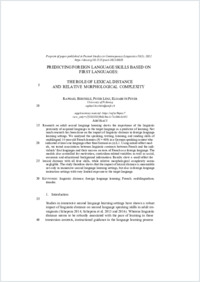Predicting Foreign Language Skills Based on First Languages : The Role of Lexical Distance and Relative Morphological Complexity
BLE-BLL
- Berthele, Raphael ORCID Université de Fribourg, Département de plurilinguisme et didactique des langues étrangères
- Peyer, Elisabeth University of Fribourg Fribourg/Freiburg Switzerland
- Lenz, Peter University of Fribourg Fribourg/Freiburg Switzerland
- 20.10.2022
Published in:
- Poznan Studies in Contemporary Linguistics. - 2022
English
Research on adult second language learning shows the importance of the linguistic proximity of acquired languages to the target language as a predictor of learning. Not much research has been done on the impact of linguistic distance in foreign language learning settings. We analysed the speaking, writing, listening, and reading skills of multilingual 14-year-old French learners (N = 409) in a German-speaking context who indicated at least one language other than German as (a) L1. Using mixed-effect models, we tested associations between linguistic contrasts between French and the individuals’ first languages and their success on tests of French as a foreign language. The models also controlled for motivation, curriculum-related variables as well as social, economic and educational background information. Results show a small effect for lexical distance with all four skills, while relative morphological complexity seems negligible. The study therefore shows that the impact of lexical distance is measurable not only in immersive second language learning settings, but also in foreign language instruction settings with very limited exposure to the target language.
- Faculty
- Faculté des lettres et des sciences humaines
- Department
- Département de plurilinguisme et didactique des langues étrangères
- Language
-
- English
- License
- License undefined
- Open access status
- green
- Identifiers
- Persistent URL
- https://folia.unifr.ch/unifr/documents/320945
Statistics
Document views: 90
File downloads:
- berthele_et_al_preprint_1.pdf: 141
